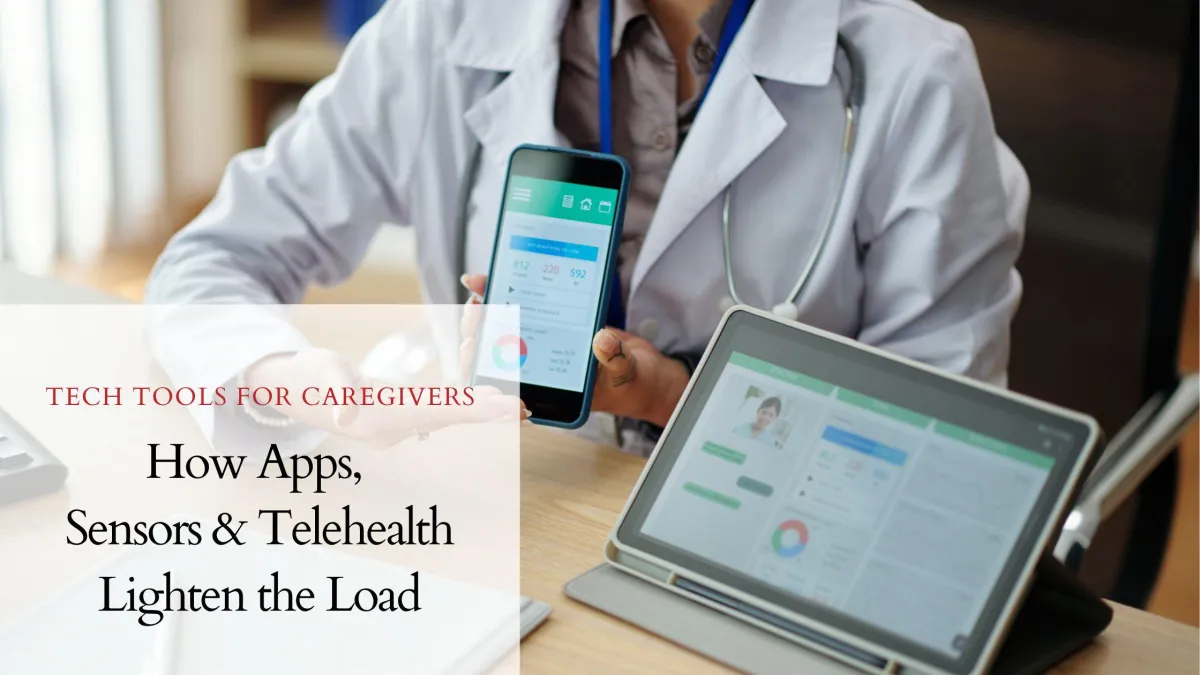
Tech Tools for Caregivers: How Apps, Sensors & Telehealth Lighten the Load
How Apps, Sensors & Telehealth Lighten the Load
Caregiving is one of the most demanding jobs—and for many families, it’s unpaid, 24/7, and emotionally exhausting. Managing medications, monitoring safety, attending appointments, and coordinating with healthcare providers can quickly overwhelm even the most organized caregivers.
Thankfully, today’s technology is transforming caregiving. From smartphone apps to smart-home sensors and telehealth platforms, these tools can reduce stress, improve safety, and give families the peace of mind they desperately need.
Here’s how caregivers can use technology to lighten the load without sacrificing compassion.
Medication Management: Staying on Schedule
Managing medications is one of the most challenging aspects of caregiving. Missed doses, double-dosing, or complex regimens can be dangerous—but technology can help.
Medication Reminder Apps
Apps like Medisafe, EveryDose, MyTherapy, and CareClinic send timely alerts when it’s time to take medication. Caregivers receive notifications if a dose is missed, and some apps even include AI assistants to answer medication-related questions. Shared access allows multiple family members to stay updated, ensuring everyone is in sync.
Smart Pill Dispensers
Devices such as Hero, MedMinder, KLIM, and Colorwing 2025 go a step further by physically dispensing the correct dose at the right time. They use alarms, lights, or app notifications and often include caregiver monitoring for adherence. These systems are especially useful for seniors, people with chronic conditions, or anyone managing multiple medications.
Why It Matters
Reduces caregiver stress
Improves adherence and safety
Allows loved ones more independence
Remote Monitoring: Eyes and Ears When You Can’t Be There
Caregivers can’t be everywhere at once, but sensors and monitoring tools can help bridge the gap.
Fall detection devices like Apple Watch, Medical Guardian, or LifeAlert automatically alert caregivers if a fall occurs.
Home sensors (motion detectors, smart door sensors, bed sensors) notify caregivers of unusual activity, like wandering or missed routines.
GPS trackers help locate loved ones with dementia quickly.
Video monitoring via devices like Amazon Alexa Show or Nest Cam allows caregivers to check in without being intrusive.
Why It Matters
Improves safety
Reduces anxiety
Allows caregivers freedom to rest or step out confidently
Telehealth: Healthcare at Your Fingertips
Doctor visits can be time-consuming and stressful. Telehealth makes access easier:
Virtual doctor visits through platforms like Amwell or Teladoc Health reduce the need for travel and waiting rooms.
Specialist access for hard-to-reach providers (neurologists, psychiatrists, therapists) is often available online.
Remote health monitoring with devices like blood pressure cuffs, pulse oximeters, and glucose monitors can share real-time data with doctors.
Mental health support via apps like BetterHelp or Talkspace helps caregivers maintain their emotional well-being.
Why It Matters
Saves time
Improves health tracking
Reduces caregiver burnout
Choosing the Right Tech
Not every tool is right for every family. Consider:
Ease of use: Can both the caregiver and patient navigate the app or device comfortably?
Integration: Can it sync with other apps, devices, or shared caregiver accounts?
Cost & coverage: Some devices are covered by Medicare, private insurance, or local programs.
Privacy & security: Ensure data storage and sharing practices comply with regulations.
Forrester Homecare: Blending Technology with Compassion
At Forrester Homecare, we believe technology should support, not replace, human connection. Our care plans integrate:
Medication management support (apps and smart dispensers)
Remote monitoring for safety
Family-focused tech tools to stay connected
With Forrester, families get the best of both worlds: advanced tools for peace of mind and compassionate caregivers to provide the human touch.
The 2025 Perspective: What’s Leading the Way
Top Medication Reminder Apps for Caregivers
Medisafe, EveryDose, MyTherapy, CareClinic
Freemium models: free basic tiers, premium $3–10/month
Features: AI assistance, caregiver dashboards, adherence tracking
Smart Pill Dispensers
Hero, MedMinder, KLIM, Colorwing 2025
Automation: dispense correct dose, alerts caregivers of missed doses
Security features: locks, reminders, and caregiver monitoring
Market Insight
Caregivers now have options ranging from simple reminder apps to fully automated dispensers. Many families combine both for maximum support.
Final Word: Stronger With Support
Technology can’t remove the challenges of caregiving, but it can make the journey safer, lighter, and more sustainable. By embracing apps, sensors, and telehealth, caregivers can reclaim energy and focus on what matters most: meaningful moments with loved ones.
Next up: If you’re curious about devices leading the way in 2025, don’t miss our next article: The Best Smart Pill Dispensers for Caregivers in 2025: Hero vs. MedMinder vs. MOBI.
